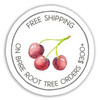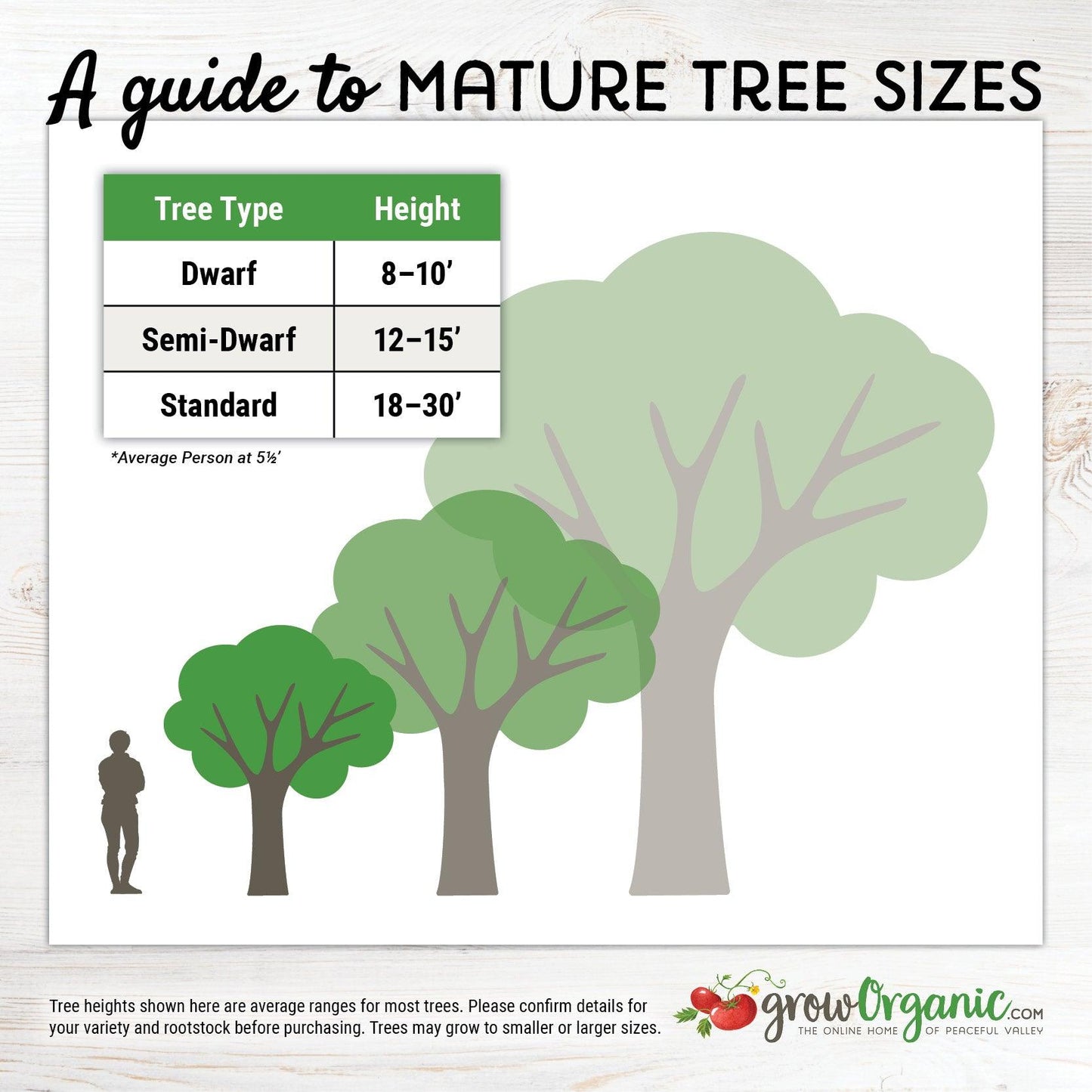Item Number: FT243
Jujube Honey Jar Tree
Tiny fruits, big sweetness
The Jujube Honey Jar Tree is a compact, productive jujube tree famous for its tiny sized fruit that bursts with sweetness. The Honey Jar Jujube (Ziziphus jujuba) is often compared to a sweet apple in both texture and flavor, with thin, glossy skin and a crisp bite that’s perfect for fresh eating. The fruit can be eaten fresh right off the branch or allowed to dry into a chewy Chinese date–style treat.
If you’re searching for a honey jar jujube tree for sale that is easy to grow, drought-tough, and beautiful in the landscape, this variety is an excellent choice.
Flavor, Fruit & Form
Tiny Fruits, Big Flavor
The jujube honey jar produces small, round to slightly elongated jujube fruits with an intense, sugary sweetness. Early in the season, they’re crunchy and juicy like a sweet apple; left on the tree, they dry naturally into rich, date-like bites. This makes jar jujube ideal for snacking, drying, baking, and even brewing sweet tea from sliced fruit.
Because this jar jujube tree blooms later than many fruit trees, it reliably sets fruit without frost damage. One tree is self-fruitful, but planting other jujube varieties nearby can improve crops.
Compact, Ornamental Tree
This fruit Honey Jar variety is naturally well-shaped and fits easily into small yards or backyard orchards. Mature trees reach about 15–20 feet tall with a similar spread. Glossy green leaves and a graceful branching pattern add ornamental value as well as a steady supply of delicious fruit.
Growing the Honey Jar Jujube Tree
Climate, Soil & Hardiness
The honey jar jujube tree thrives in USDA zones 5–10 and is exceptionally drought tolerant once established. It performs well in hot, arid regions and handles poor, sandy, or alkaline soils as long as it is planted in well-drained soil.
Key details:
- USDA zones: 5–10
- Chill hours: about 200
- Harvest: typically mid to late September
Planting & Care Tips
Your bare root honey jar jujube tree should be planted in late winter or early spring in a sunny spot with good air flow. Water regularly during the first year to establish roots; after that, this tree is very easy to grow with occasional deep watering.
- Plant in full sun
- Space trees 10–15 feet apart
- Prune in winter to maintain shape and encourage new fruiting wood
To learn more about caring for orchard trees in general, check out our fruit trees growing guide. For a deeper comparison of jujube varieties, you can explore our detailed tree characteristics chart.
Why Buy Honey Jar Jujube From Us?
When you choose a honey jar jujube tree for sale or jujube honey jar tree for sale from us, you’re getting a high-quality, grafted bare root tree selected for vigor and productivity. This honey jar cultivar consistently sets fruit, producing sweet, crisp jujube fruits that can be eaten fresh or dried as Chinese date snacks.
Whether you’re looking for a honey jar jujube for sale, a honey jujube tree for sale, or specifically a honey jar jujube tree for sale near your location, we ship to a wide range of climates so you can enjoy this standout variety at home. Browse more options in our full collection of jujube trees.
The honey jar jujube tree is a compact, hardy, and delicious addition to any garden—perfect for both new and experienced growers who want a reliable, low-maintenance jujube tree that delivers big sweetness in every small fruit.
For more information about different types of rootstocks and how they influence tree size and growth, see our Tree Rootstock Characteristics Chart.



Check Your Zone Compatibility:
Compatible with your zone.
Growing Zone for

Our Guarantee To You
Since 1976, we've served our customers at every stage of growing. Please contact us at any time. We are happy to support and assist you.
Shipping Information
Shipping Information
Cannot ship to the following states: HI, AK, PR, GU, VI
Shipping Weight: 5.0 lb
Dimensions: 47.5"L x 7.3"W x 2.75"H
Features
Features
- Bare Root
- Self-fruitful
- Suited to Warmer Climates
Characteristics
Characteristics
Planting & Care
Planting & Care
Useful Information
Useful Information
Guarantee
Guarantee
Limited Dormant Tree & Plant Guarantee
* Claim deadline is June 15th
We guarantee that your dormant tree or plant will arrive in good, viable condition. If your tree arrives in substandard condition, notify us within 3 days of delivery. Please email pictures of the box, inside packaging, the tree and its roots to helpdesk@groworganic.com. We will investigate your claim and process a request to exchange or refund the damaged product.
If your dormant tree or plant has not grown new leaves by June 15th, you may be eligible for our Limited Dormant Tree & Plant Guarantee. This guarantee provides for a store credit for the purchase price of the tree, excluding shipping. Please see the Instructions below.
Important Dates:
- April 1st Dormant trees/plants must be planted in the ground
- May 15th Perform scratch test, if no new leaves have grown
- June 15th Deadline to apply for a dormant tree/plant credit
All required documentation must be received by June 15th for your claim to be considered. Claims or documentation received after June 15th will be denied, without exception. Instructions listed below
Terms and Conditions
We cannot guarantee that your tree or plant will remain alive and healthy after it is received, or bear fruit as there are too many variables in your environment that are beyond our control (i.e. soil preparation, weed and pest control, proper irrigation, chill hours, compatible hardiness for your growing zone, proper choice of pollinator, extreme weather, rodent damage, disease, etc.).
We cannot guarantee that we will be able to provide a replacement tree/plant of the same species either that same growing season or in future years. Customers are responsible for all shipping fees associated with replacement trees and plants.
If we determine that the tree you purchased directly from us is not viable, we will issue you a store credit (not a refund) for the purchase price of the affected dormant tree or plant. Shipping is not included in the dormant tree/plant guarantee. Store credits can be used to purchase any product we sell and are valid for use only until July 1st of the following year.
Historically, 98% of our dormant trees and plants grow and thrive when they have been cared for and planted using our growing guides. Dormant trees and plants must be planted in the ground by April 1st in order to be eligible for credit. If the ground in your area is still frozen solid, you may temporarily plant your tree or plant in a pot.
Potted, non-dormant trees or plants are excluded from this guarantee as they are not dormant at the time of shipment. Evergreen trees such as citrus, avocado and olive trees are not available for credit under the Dormant Tree and Plant Guarantee.
Instructions
We guarantee that your dormant fruit tree or plant will leaf out, if you care for it according to our growing guides. In the unlikely event that your dormant tree or plant does not have leaves by May 15th, follow these simple steps to apply for a store credit:
Before you call or email, please perform a “scratch test” to determine if the tree or plant is still alive. This video shows how to check for live tissue under the bark. Scratch tests need to be done a few inches above and below the graft.
Green Cambium Layer / Living Trees
If the cambium layer under the bark is green, give your tree a little more time. It is still alive, but hasn’t come out of dormancy yet. Check to make sure that it is getting the right amount of deep root water, enough sunlight and that the weather is warm enough for that type of tree/plant to come out of dormancy. Every tree has its own personality and will come out of dormancy at different times. Be sure to submit the required documentation listed below by June 15th, if it doesn’t grow leaves.
Brown Cambium Layer / Dead Trees
If the scratch test shows a brown cambium layer or if your dormant tree/plant doesn’t have leaves by June 1st, please email us at helpdesk@groworganic.com. All required documentation listed below must be received by June 15th for your claim to be considered. To be considered for the guarantee claim, all required documentation must be received by June 15th. Incomplete submissions will be denied.
Required Documentation
- Order number
- Name of dormant tree/plant and the quantity affected
- Photos of each tree or plant showing:
- The roots (tree or plant must be pulled out of the ground)
- The scratch test areas
- The entire tree/plant
We reserve the right to not issue credit for items that have already been replaced. We also reserve the right to require photographic evidence that the tree/plant was not killed by root rot, rodent or mechanical damage.
Share




I purchase off and on and have never been dissappointed! I have the lei and one other jujubes and they are so awesome and within 2 years in ground we have more friit than we can handle! But we love them! We just got the honey jars! Beautiful well rooted healthy big trees! Planting them today! Have had them in pots and already budding leaves! I suspect we will be reaping these fruits as well soon! Best trees! Best company! Best customer service!!
Very good product
My friend ordered one this spring and it already have a lot of fruits. I just pre-ordered five for other friends.
This arrived in perfect condition and I'm excited for years of fruitfulness with it. :) I got one last year and just had to get more. :)






